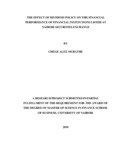| dc.contributor.author | Chege, Alex M | |
| dc.date.accessioned | 2019-01-17T06:33:05Z | |
| dc.date.available | 2019-01-17T06:33:05Z | |
| dc.date.issued | 2018 | |
| dc.identifier.uri | http://hdl.handle.net/11295/104899 | |
| dc.description.abstract | The nature of association between dividend policy and financial performance in finance sector has faced unresolved debate among different researchers over the recent time. Dividend policy is a significant constituent of a firm and ought to be managed prudently considering that it ties up a substantial percentage of the firm share returns. The main objective of firms is to maximize shareholders wealth by increasing the stock returns and paying out dividends. Large firms may opt to pay dividends on quarterly bases while other firms pay on annual basis of accounting period. This study sought to investigate the effect of dividend policy on financial performance of on financial institutions listed at the NSE. The independent variable for the study was dividend policy and the dependent variable was firm‟s financial performance while the control variables included; financial leverage, firm‟s liquidity and firm‟s size. It adopted descriptive research design. The population consisted of all 23 financial Institutions registered at the NSE. The sampling period is 5 years from 2013 to 2017. The study used quantifiable secondary data which was analysed using descriptive and inferential statistics to analyze on SPSS version 22. The data sources included all NSE hand books and company‟s annual reports for the study period was from year 2012 to year 2017. From the results of correlation analysis, it was established that dividend policy measured by dividend payout ratio positively contributed to ROA which had statistically insignificant effect, this also applies to financial leverage and firm liquidity while firm size had a negative and statistically significant relationship with financial performance. The results of the study produced R-square value of 0.165 which means that about 16.5 percent of the variation in financial performance of financial institutions quoted at the NSE can be explained by the four selected independent variables while 83.5 percent in the variation of financial performance of financial institutions listed at the NSE was associated with other factors not covered in this research. The study also found that the independent variables had a moderate correlation with financial performance of financial institutions listed at the NSE (R=0.406). ANOVA results show that the F statistic was significant at 5% level with a p=0.001. Therefore the model was fit to explain the association between the selected variables. The conclusion of this study is that dividend payouts are important and they actually affect the firms‟ performance positively. The study also concludes that since financial leverage (debt to equity ratio) and firm liquidity have positive contribution to financial performance for firms listed at the NSE, they can be used to leverage the firm‟s value. This study therefore recommends that having shown the association between financial performance and dividend policy, management and board of directors should take the appropriate dividend policies so as to satisfy shareholders‟ goal of maximizing their returns | en_US |
| dc.language.iso | en | en_US |
| dc.publisher | university of nairobi | en_US |
| dc.rights | Attribution-NonCommercial-NoDerivs 3.0 United States | * |
| dc.rights.uri | http://creativecommons.org/licenses/by-nc-nd/3.0/us/ | * |
| dc.subject | Effect of Dividend Policy | en_US |
| dc.title | The Effect of Dividend Policy on the Financial Performance of Financial Institutions Listed at Nairobi Securities Exchange | en_US |
| dc.type | Thesis | en_US |



